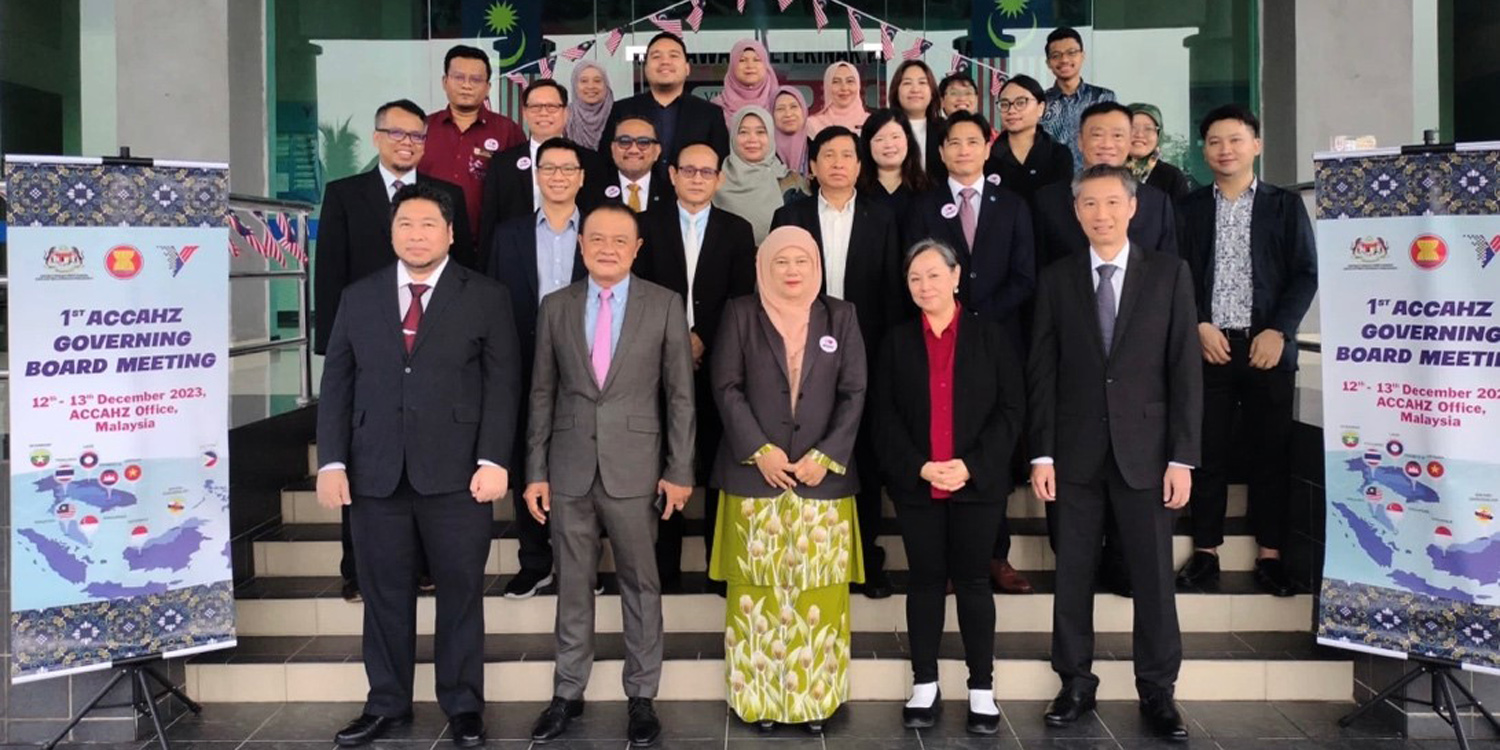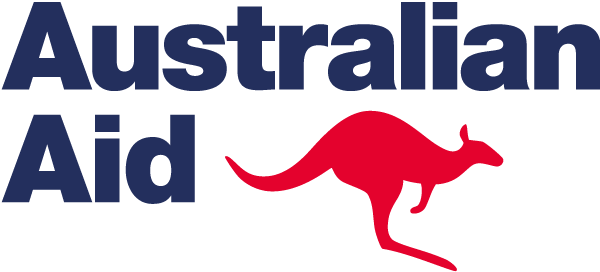Strengthening animal health cooperation in Southeast Asia: Malaysia takes a significant step towards the ASEAN Coordinating Centre for Animal Health and Zoonoses

ACCAHZ Governing Board and partners group photo in Malaysia.
©FAO
20/12/2023
In the ongoing pursuit of safeguarding the region against emerging infectious diseases (EIDs), Southeast Asia takes a significant step forward with the inaugural meeting of the ASEAN Coordinating Centre for Animal Health and Zoonoses (ACCAHZ) Governing Board in Sepang, Malaysia. The meeting was conducted at the ACCAHZ office, located at Makmal Veterinar Zon Tengah, Selangor, under the Department of Veterinary Services, Malaysia. The office is part of the contribution provided by the Government of Malaysia who is the ACCAHZ host country. The Food and Agriculture Organization of the United Nations (FAO) Emergency Centre for Transboundary Animal Diseases (ECTAD) was invited to the meeting and officially became an ACCAHZ Associate Member. This was made possible through support from the Strengthening Mechanisms in Animal-health for a Resilient ASEAN project funded by the Australian Government, Department of Foreign Affairs and Trade (DFAT) in partnership with ASEAN and FAO. This collaborative effort underscores the commitment to boost regional coordination to prevent and control transboundary animal and zoonotic diseases.
Southeast Asia has long been recognized as a hotspot for EIDs, 75 percent of which originate in animals, posing threats of global health security, loss of livestock and poultry and socio-economic impacts. Non-zoonotic but high-impact transboundary animal diseases such as foot-and-mouth disease and African swine fever pose a serious threat to the livelihoods and food security of millions of farmers in the region.
The first ACCAHZ Governing Board meeting marks a milestone for the region. It signifies a shift in focus from preparation to action, replacing the ACCAHZ Preparatory Committee. This transition represents Southeast Asia's commitment to proactively address the challenges posed by transboundary and zoonotic diseases.
“As the host of the ACCAHZ, Malaysia welcomes ASEAN Member States, international partners, including FAO and DFAT, and stakeholders to shape the future of animal health and zoonoses cooperation in Southeast Asia. This pivotal meeting aims to finalize crucial operational instruments, develop a strategic five-year workplan and formulate a resource mobilization plan, marking a significant step towards the official launch of ACCAHZ next year,” said Dr Akma Ngah Hamid, Director-General of Malaysia’s Department of Veterinary Services.
A decade-long journey: ACCAHZ's evolution
The origins of ACCAHZ can be traced back to the declaration of support and commitment by the ASEAN Ministers on Agriculture and Forestry (AMAF) in 2010. The resulting AMAF Statement initiated the establishment of ACCAHZ, envisioning a coordinated regional approach to detect, prevent and control animal health and zoonoses, focusing on anticipating potential pandemics originating from animals.
The subsequent years witnessed milestones such as the endorsement of the Agreement for the Establishment of ACCAHZ in 2016 and its full ratification by all ASEAN Member States (AMS) in 2021. The global response to the COVID-19 pandemic further emphasized the need for a comprehensive and integrated regional approach.
“FAO has been supporting the establishment of ACCAHZ since its declaration in 2010, and the governing board meeting stands as a historic endeavour for all of us—a decade journey made possible by a collective and sustained effort,” stated FAO ECTAD Regional Manager Kachen Wongsathapornchai. “Through the Strengthening Mechanisms in Animal-health for a Resilient ASEAN (SMART-ASEAN) project funded by the Australian Government, and with FAO becoming ACCAHZ Associate Member, I affirm our unwavering commitment to partnership with ACCAHZ and looking forward to its launch in 2024.” He added.
The Australian Ambassador to ASEAN, H.E. Will Nankervis, highlighted the pivotal role of ASEAN Member States in fostering collaboration on animal health. He emphasized that their efforts in ACCAHZ operationalization have amplified the recognition of the value of such cooperation within ASEAN's health initiatives. Ambassador Nankervis stated, "Through our partnership, Australia's technical agencies are also reinforcing regional animal health systems. Our support to ASEAN's animal health and agriculture sector is part of our Comprehensive Strategic Partnership with ASEAN. We are committed to ASEAN’s centrality at the heart of the Indo-Pacific and advancing a healthy, safe and prosperous region."
More on this topic
Southeast Asia has long been recognized as a hotspot for EIDs, 75 percent of which originate in animals, posing threats of global health security, loss of livestock and poultry and socio-economic impacts. Non-zoonotic but high-impact transboundary animal diseases such as foot-and-mouth disease and African swine fever pose a serious threat to the livelihoods and food security of millions of farmers in the region.
The first ACCAHZ Governing Board meeting marks a milestone for the region. It signifies a shift in focus from preparation to action, replacing the ACCAHZ Preparatory Committee. This transition represents Southeast Asia's commitment to proactively address the challenges posed by transboundary and zoonotic diseases.
“As the host of the ACCAHZ, Malaysia welcomes ASEAN Member States, international partners, including FAO and DFAT, and stakeholders to shape the future of animal health and zoonoses cooperation in Southeast Asia. This pivotal meeting aims to finalize crucial operational instruments, develop a strategic five-year workplan and formulate a resource mobilization plan, marking a significant step towards the official launch of ACCAHZ next year,” said Dr Akma Ngah Hamid, Director-General of Malaysia’s Department of Veterinary Services.
A decade-long journey: ACCAHZ's evolution
The origins of ACCAHZ can be traced back to the declaration of support and commitment by the ASEAN Ministers on Agriculture and Forestry (AMAF) in 2010. The resulting AMAF Statement initiated the establishment of ACCAHZ, envisioning a coordinated regional approach to detect, prevent and control animal health and zoonoses, focusing on anticipating potential pandemics originating from animals.
The subsequent years witnessed milestones such as the endorsement of the Agreement for the Establishment of ACCAHZ in 2016 and its full ratification by all ASEAN Member States (AMS) in 2021. The global response to the COVID-19 pandemic further emphasized the need for a comprehensive and integrated regional approach.
“FAO has been supporting the establishment of ACCAHZ since its declaration in 2010, and the governing board meeting stands as a historic endeavour for all of us—a decade journey made possible by a collective and sustained effort,” stated FAO ECTAD Regional Manager Kachen Wongsathapornchai. “Through the Strengthening Mechanisms in Animal-health for a Resilient ASEAN (SMART-ASEAN) project funded by the Australian Government, and with FAO becoming ACCAHZ Associate Member, I affirm our unwavering commitment to partnership with ACCAHZ and looking forward to its launch in 2024.” He added.
The Australian Ambassador to ASEAN, H.E. Will Nankervis, highlighted the pivotal role of ASEAN Member States in fostering collaboration on animal health. He emphasized that their efforts in ACCAHZ operationalization have amplified the recognition of the value of such cooperation within ASEAN's health initiatives. Ambassador Nankervis stated, "Through our partnership, Australia's technical agencies are also reinforcing regional animal health systems. Our support to ASEAN's animal health and agriculture sector is part of our Comprehensive Strategic Partnership with ASEAN. We are committed to ASEAN’s centrality at the heart of the Indo-Pacific and advancing a healthy, safe and prosperous region."
In partnership with:
Contact
- Rindu Putri, FAO ECTAD Regional Communications Specialist
